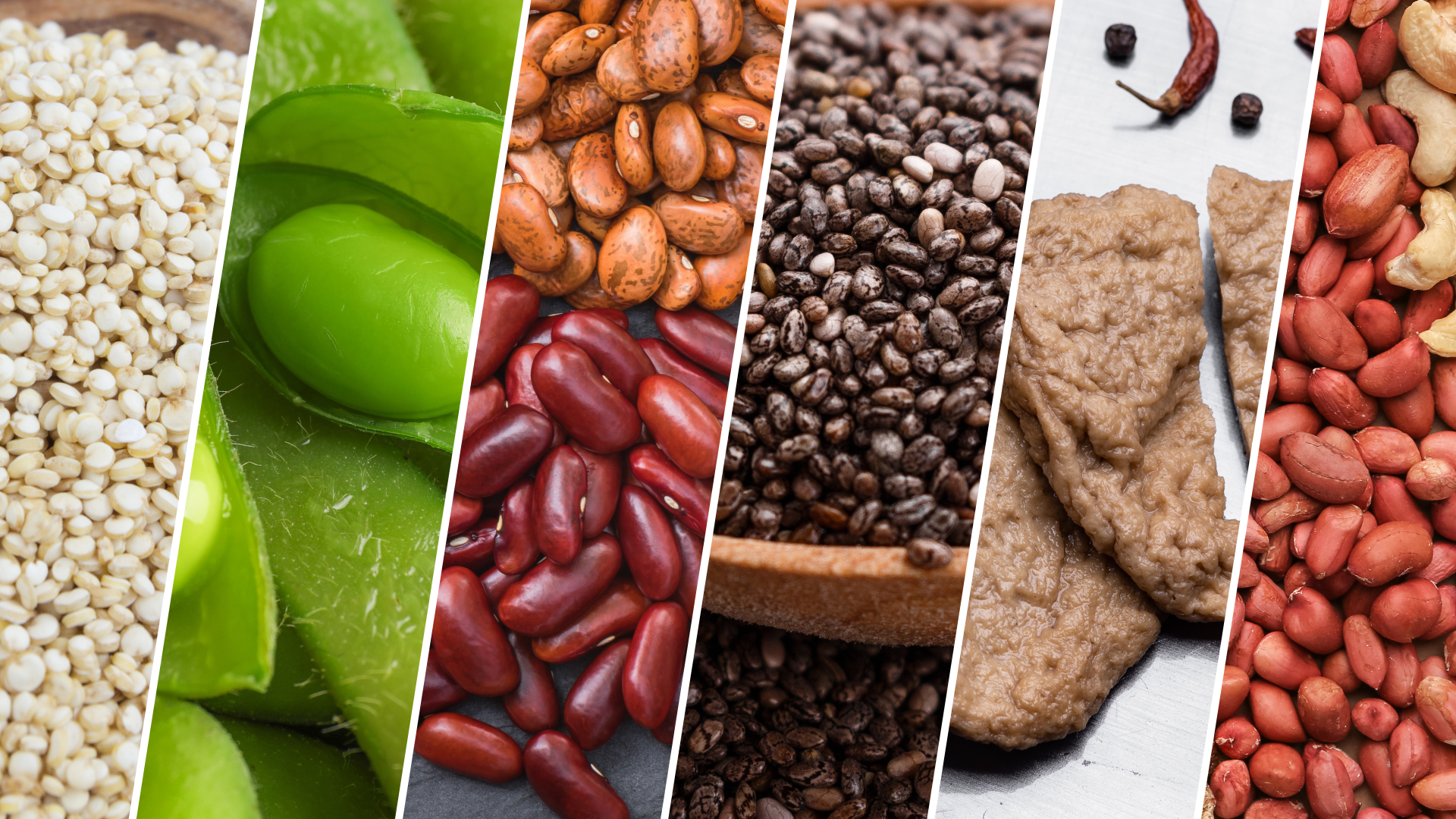Some of the links on this page are affiliate links, which means that Buzzy Kitchen earns commission from purchases made – at absolutely no extra cost to you. Thank you so much for supporting Buzzy Kitchen!
Protein is a crucial macronutrient with various essential functions in the body, so it makes sense to ensure that you’re getting enough in your diet. This can be particularly difficult for those who don’t eat meat, but thankfully, there are plenty of plant-based protein sources you can look to instead.
Why don’t we dive right in and find out more?
Top 10 Plant-Based Protein Sources
Protein plays a crucial role in not only building but also repairing the body’s tissues, known as an essential macronutrient. It produces enzymes and hormones and supports the entire immune system. The amount of protein an individual needs per day can vary based on several factors, including age, sex, weight, physical activity level, and overall health.
The Recommended Dietary Allowance (RDA) for protein in adults is calculated by multiplying your body weight in kilograms by 0.8 grams. You should have 0.8 grams of protein for every one kilogram of weight.
If you weigh 80kg, you’ll need 80kg x 0.8g = 64 grams of protein per day.
Protein is a primary component of muscles, and it plays a fundamental role in the structure, function, and repair of muscle tissues. Adequate protein intake is particularly important for individuals engaged in regular physical activity, including athletes and those involved in strength training.
1: Legumes
Legumes are a large and diverse family of plants belonging to the Fabaceae family. They are best known for their fruits, which are pods that contain seeds. They’re valued for their high protein and nutrient content, and they play a crucial role in both agriculture and human nutrition. The term “legume” refers not only to the plants but also to the seeds (or pulses) they produce – the things we eat.
Lentils, chickpeas, black beans, and soybeans are all legumes, and they are also excellent sources of protein for those following a vegan or vegetarian diet.
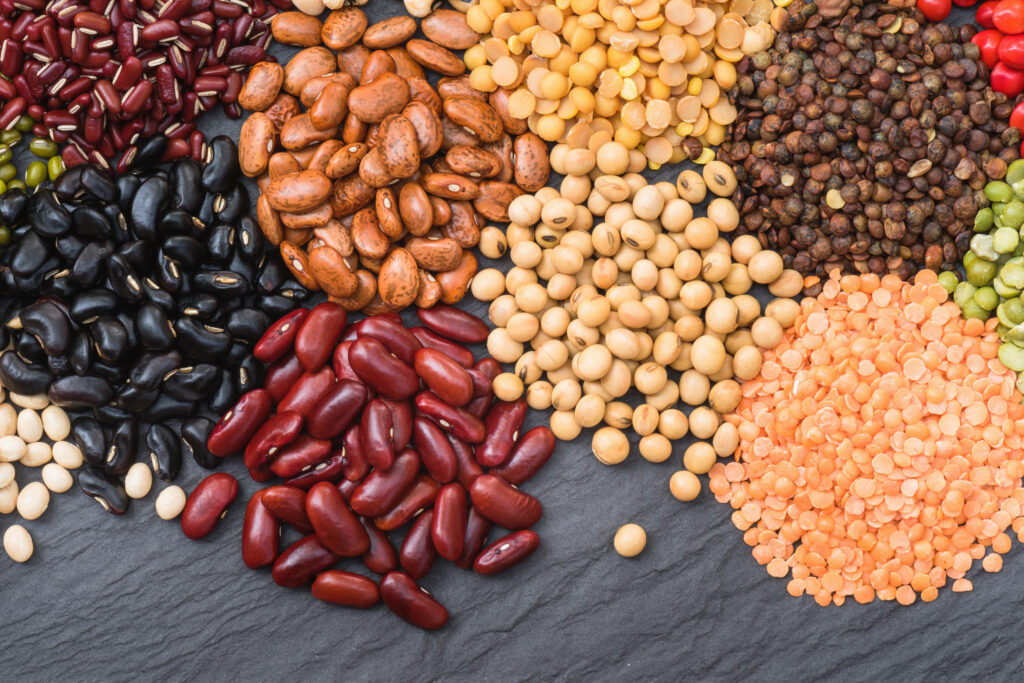
Lentils
Lentils are small, lens-shaped seeds that belong to the legume family. They come in various colours, including brown, green, red, and black, and are a staple in many cuisines around the world. Lentils have been cultivated for thousands of years and are valued for their high nutritional content, versatility in cooking, and relatively quick cooking time compared to other legumes.
100g boiled lentils = 9g protein.
Chickpeas
Chickpeas are sometimes known as garbanzo beans, and they are one of many types of legumes that belongs to the Fabaceae family. They are one of the oldest cultivated crops, with evidence of their cultivation dating back over 7,000 years in the Middle East. Chickpeas are widely grown and consumed in many parts of the world and are a key ingredient in various cuisines, particularly Indian, Ethiopian, and other Middle Eastern cuisines.
100g boiled chickpeas = 9g protein.
Black Beans
Black beans, scientifically known as Phaseolus vulgaris, are a type of legume belonging to the Fabaceae family. They are a staple in many cuisines around the world and are particularly common in Latin American, Caribbean, and Southwestern U.S. cuisine. Black beans are well known for their rich, earthy flavour and firm texture, and they offer several health benefits.
Their fibre content supports digestive health, and they contribute to satiety, making them a good choice for weight management. The combination of protein, fibre, and various nutrients in black beans also makes them a nutritious addition to a balanced diet.
100g boiled black beans = 8g protein.
Soya Beans
Soya beans are native to East Asia, and are known by the scientific name Glycine max. They have been an essential part of Asian diets for thousands of years and are now cultivated globally for their versatile uses. Soya beans are a unique legume because they are rich in both protein and oil, making them a valuable crop for various purposes.
These beans contain all amino acids that are considered “essential” for the body, alongside being one of the excellent plant-based protein sources. They’re rich in healthy fats, including polyunsaturated fats, and they are a good source of vitamins and minerals, such as folate, potassium, and iron.
100g boiled soybeans = 17g protein.
2: Quinoa
Quinoa (pronounced keen-wah) is a flowering plant that belongs to the amaranth family (Amaranthaceae). The seeds of the quinoa plant are edible and are considered a pseudocereal, meaning they are consumed in the same way as true cereals (like wheat or rice) but belong to different plant families. It is a grain-like seed that is a complete protein, meaning it contains all essential amino acids.
Quinoa seeds are the edible part of the plant and are known for their nutritional richness. They come in various colours, including white, red, black, and tricolour varieties, and they’re highly nutritious, offering a good balance of carbohydrates, protein, and healthy fats.
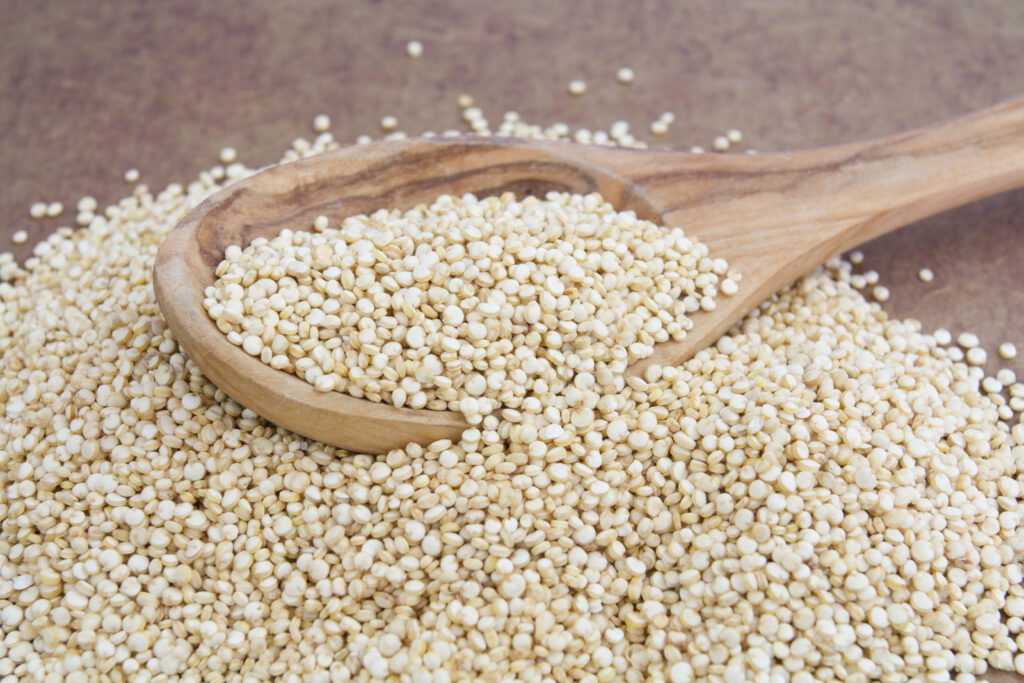
Quinoa is particularly great vegans and vegetarians because it is a complete protein, which means it contains all nine essential amino acids that the human body cannot produce on its own. It is also a great source of dietary fibre, vitamins (such as B vitamins), and minerals (such as iron and magnesium).
100g quinoa = 16.5g protein.
3: Tofu and Tempeh
Bean curd, more popularly known as soybean or soya bean, is a popular food in many Asian cuisines. Made from soya beans, the versatile ingredient is a staple and is widely used in vegetarian and vegan dishes as a plant-based source of protein. Tofu is created through a process that involves curdling soy milk and then pressing the resulting curds into blocks.
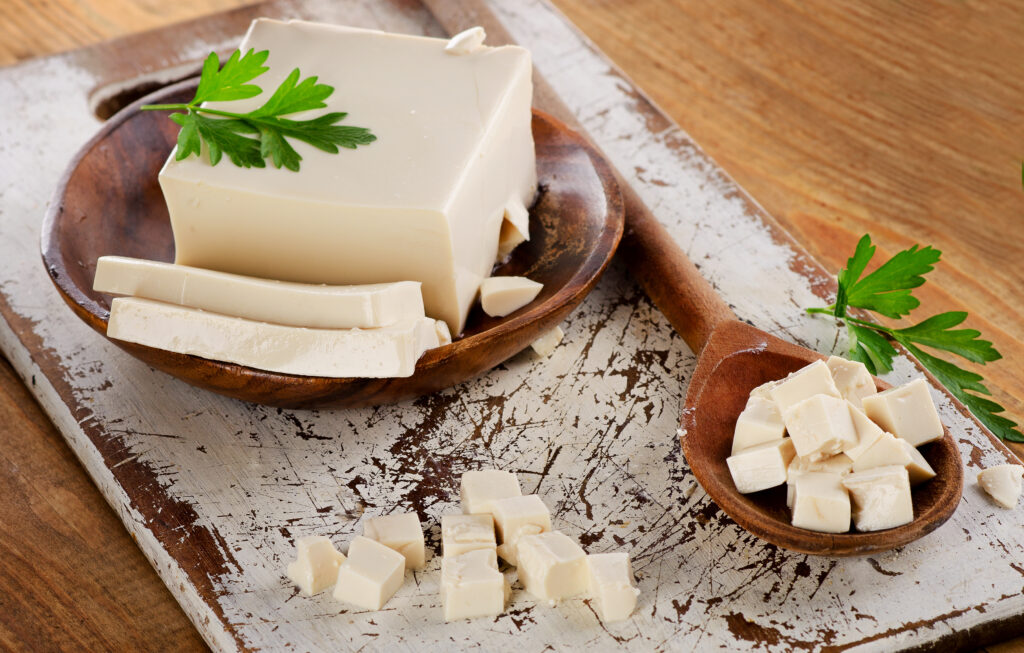
Tempeh is a traditional Indonesian food product made from fermented soybeans. It has a firm, dense texture, and a unique nutty, earthy flavour, and is a popular source of plant-based protein used in various cuisines around the world. It’s a very nutrient-dense food and an excellent source of plant-based protein, containing all essential amino acids.
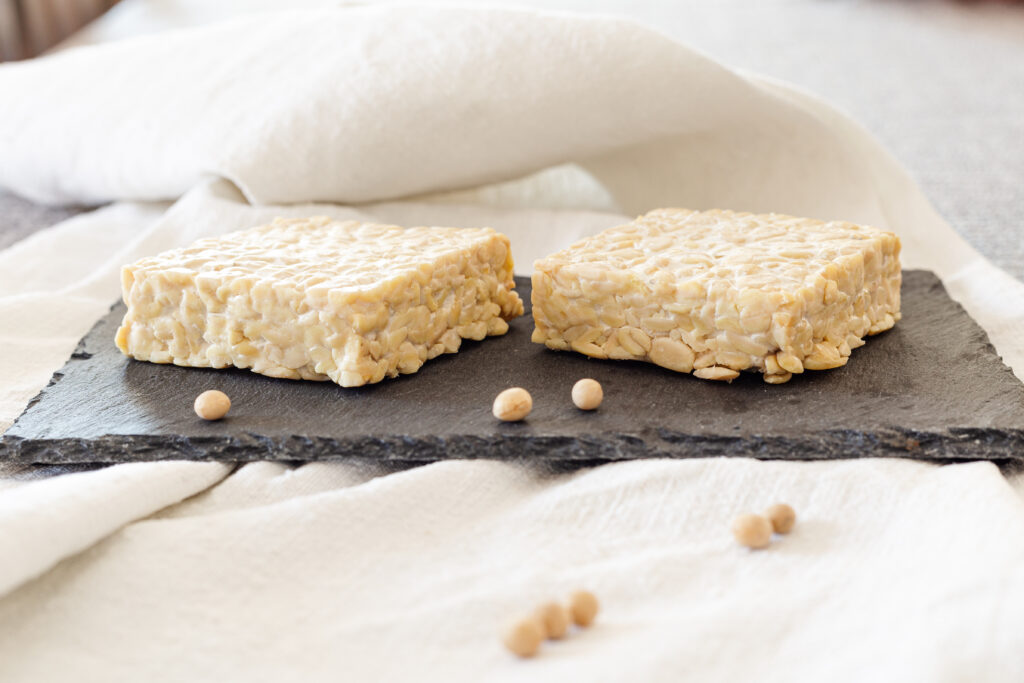
Additionally, the fermentation process increases the bioavailability of certain nutrients and may improve digestion.
100g tofu = 8g protein.
100g tempeh = 19g protein.
4: Edamame
Edamame refers to young, green soybeans that are harvested before they fully mature. The word “edamame” is Japanese, translating to “stem beans” or “twig beans.” These soybeans are typically harvested when they are still in the pod and have a tender texture and a sweet, slightly nutty flavour.
It’s worth noting that edamame is different from mature soybeans, which are used to produce various soy-based products like tofu, tempeh, and soy milk.
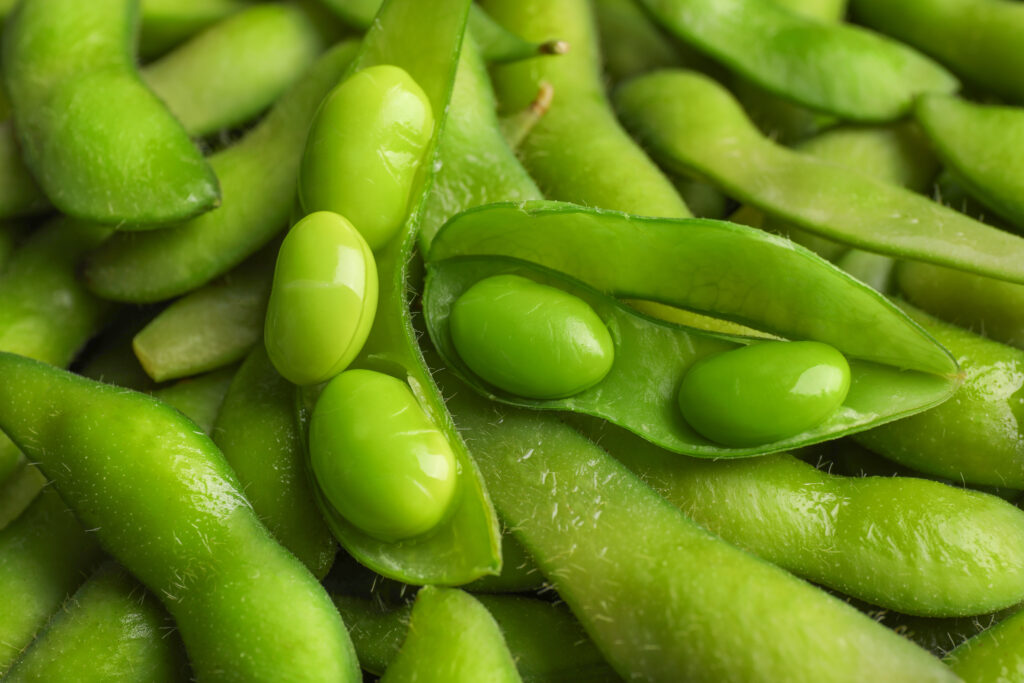
Edamame is a nutritious food and a good source of plant-based protein, fibre, vitamins, and minerals. It is particularly rich in folate, vitamin K, and manganese. Additionally, edamame provides all essential amino acids, making it a complete protein.
100g cooked edamame = 11g protein.
5: Seitan
Seitan, also known as wheat gluten, is a high-protein meat substitute made from gluten, the protein component of wheat. It has a chewy and meat-like texture, making it a popular choice in vegetarian and vegan diets as a plant-based protein source. Seitan is particularly valued for its ability to absorb flavours and take on the characteristics of the dishes in which it is used.
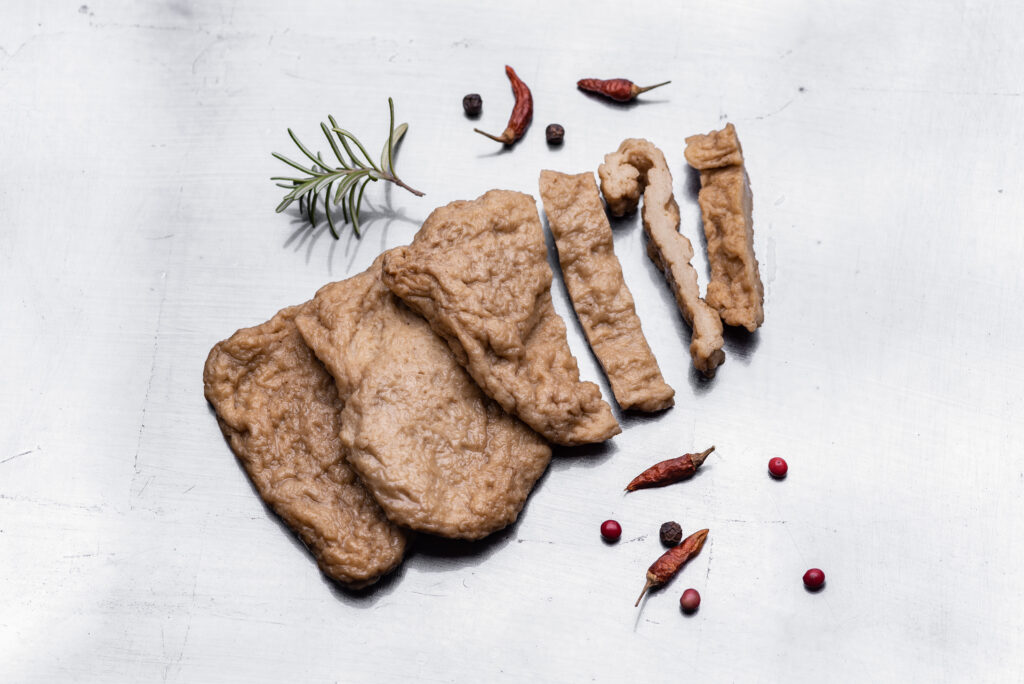
This meat substitute is a versatile ingredient that can be used in a variety of dishes. It can be sliced, diced, shredded, or crumbled and used in stir-fries, sandwiches, stews, and more. It has a chewy, meaty texture that is similar to certain animal proteins, and this makes it a popular meat substitute in various dishes.
100g seitan = 75g protein.
6: Chia Seeds
Chia seeds are small, nutrient-dense seeds that come from the Salvia hispanica plant, which is a member of the mint family. These seeds are native to Mexico and Guatemala and have been consumed for centuries, dating back to ancient civilizations like the Aztecs and Mayans.
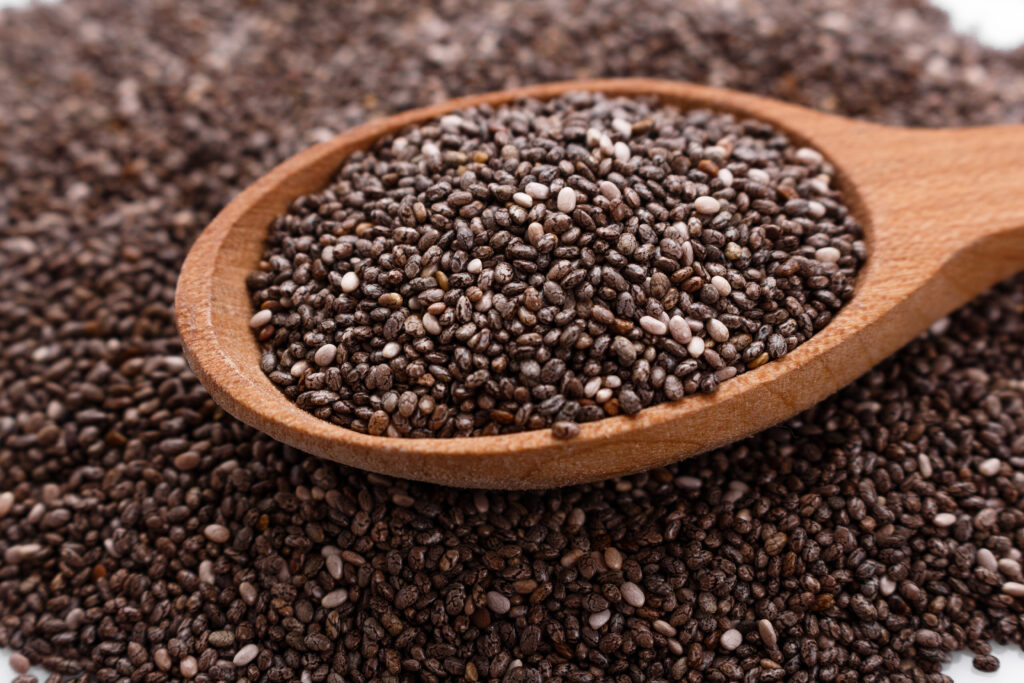
The seeds are highly nutritious and considered a superfood because of the high amounts of essential nutrients. These include:
- Omega-3 fatty acids (particularly alpha-linolenic acid or ALA)
- Fibre
- Proteins
- Vitamins
- Minerals
When mixed with water or other liquids, chia seeds swell and create a gel-like mixture. This makes them popular for use in chia puddings or as an ingredient in smoothies and beverages.
100g chia seeds = 17g protein.
7: Hemp Seeds
Hemp seeds are the seeds of the hemp plant, scientifically known as Cannabis sativa, and they are sometimes known as hemp hearts. These seeds are nutritious and have gained popularity for their health benefits, particularly their benefit of being a complete protein source, meaning they provide all essential amino acids.
It’s important to note that hemp seeds come from a variety of the cannabis plant that is cultivated for industrial purposes and contains very low levels of THC (tetrahydrocannabinol), the psychoactive compound associated with marijuana. Hemp seeds do not have the mind-altering effects associated with THC.
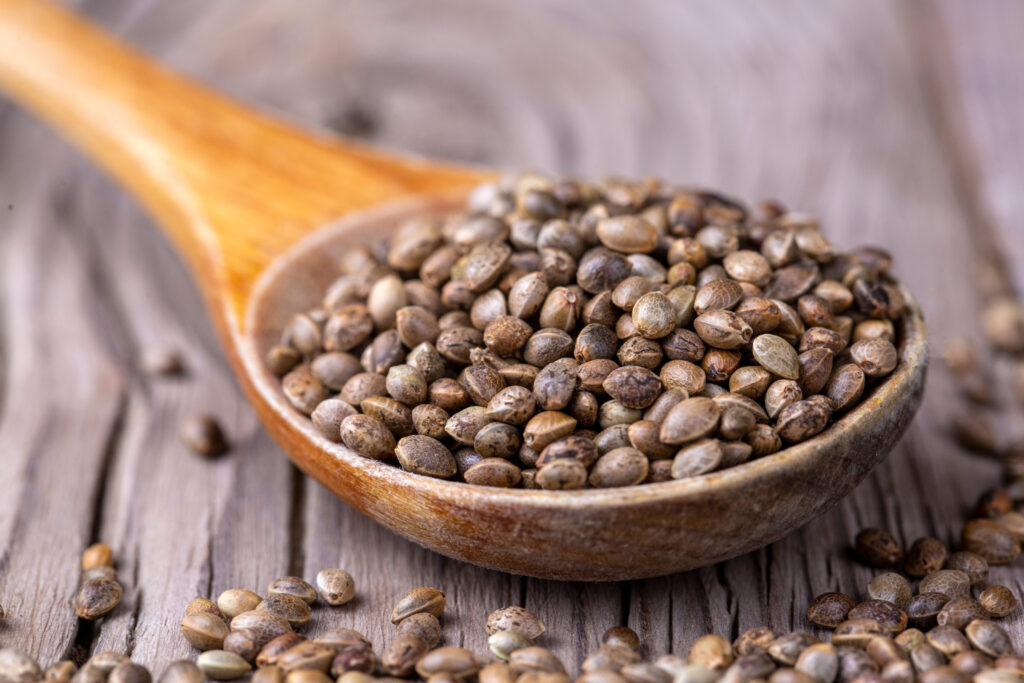
Hemp seeds are a complete protein source, meaning they provide all essential amino acids. That’s not all, though. They also contain a balanced ratio of omega-3 and omega-6 fatty acids, which are essential for heart health; are a good source of both soluble and insoluble fibre, supporting digestive health; and contain vitamins such as vitamin E and various minerals, including magnesium, phosphorus, potassium, zinc, and iron.
100g hemp seeds = 31.5g protein.
8: Spirulina
Spirulina is a type of blue-green algae that is widely recognized for its potential health benefits. It is a microscopic, spiral-shaped, multicellular organism that grows naturally in alkaline lakes, ponds, and other freshwater environments, and it has been consumed as a food source for centuries.
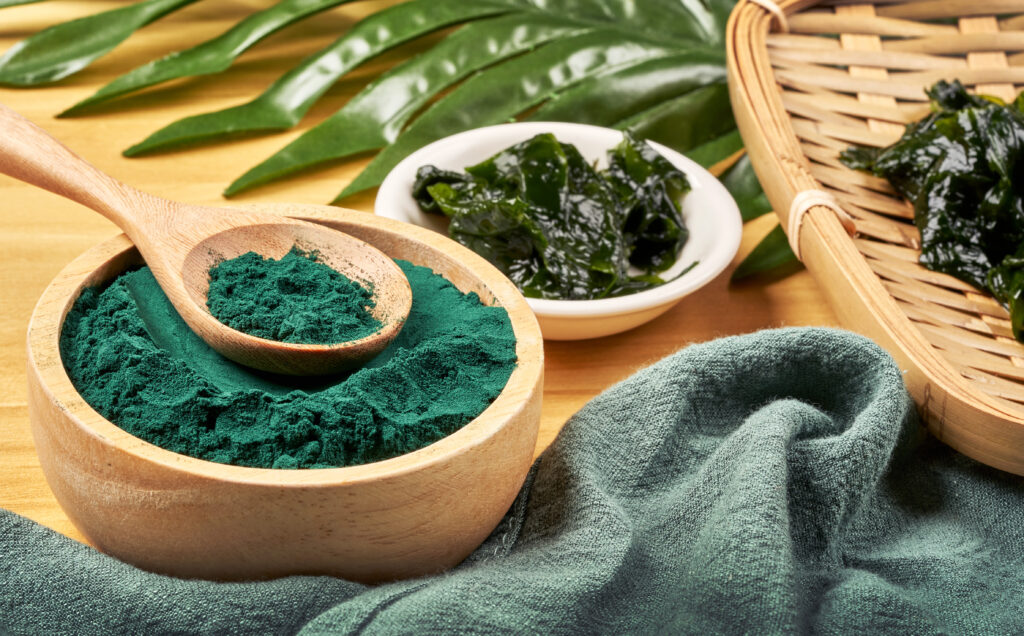
Considered a nutrient-dense superfood, spirulina is a good source of protein, containing all essential amino acids, making it a valuable protein source for individuals following vegetarian, vegan, or plant-based diets.
100g spirulina = 57g protein.
9: Nuts and Nut Butters
Nuts and butters created from nuts are highly nutritious, particularly when it comes to protein. Peanuts are technically legumes, but they are often categorized with nuts due to their similar nutritional profile. They contain bioactive compounds that can enhance the absorption of nutrients, such as carotenoids, from other foods consumed in the same meal, but that’s not all.
The fibre and healthy fats in peanuts may contribute to better blood sugar control by slowing down the absorption of sugar. They also contain antioxidants, including resveratrol, which has been associated with various health benefits, including heart health and potential anti-aging effects.
100g peanuts = 25g protein.
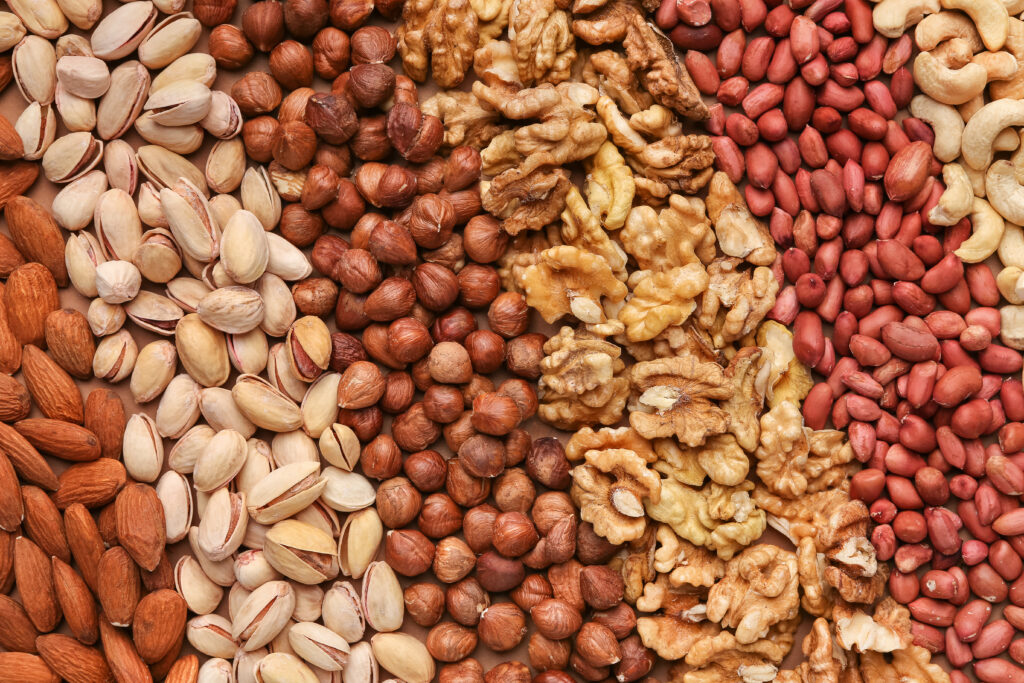
Almonds
Almonds are another nut with a significant protein content. Almonds are particularly known for their heart-healthy monounsaturated fats and are a good source of vitamin E, magnesium, and manganese. They also provide protein and dietary fibre, making them a satisfying and nutritious snack. Additionally, almonds are naturally gluten-free, making them suitable for individuals with gluten sensitivities.
100g almonds = 21g protein.
Pistachios
Pistachios are rich in antioxidants, including lutein, zeaxanthin, and gamma-tocopherol, which help protect cells from oxidative damage. They contain heart-healthy monounsaturated and polyunsaturated fats, which may help lower bad cholesterol (LDL) levels and increase good cholesterol (HDL) levels, contributing to cardiovascular health.
They’re also rich in essential nutrients, including protein, dietary fibre, vitamins (such as B vitamins), and minerals (such as phosphorus, potassium, and magnesium).
100g pistachio = 20g protein.
Cashews
Cashews contain monounsaturated and polyunsaturated fats, which may help lower bad cholesterol (LDL) levels and reduce the risk of heart disease. The majority of fats in cashews are heart-healthy monounsaturated fats, which can contribute to overall cardiovascular health, and despite being calorie-dense, cashews can be a satisfying and nutrient-dense snack, helping to control appetite and contribute to weight management.
100g cashews = 17g protein.
Walnuts
Walnuts have a lower protein content compared to some other nuts but are still a good source. They’re also a great source of antioxidants, including vitamin E and polyphenols, which help protect cells from oxidative damage.
These nuts are rich in alpha-linolenic acid (ALA), a type of omega-3 fatty acid, which has been linked to improved heart health by reducing risk factors for heart disease. The majority of the fats in walnuts are polyunsaturated fats, including both omega-3 and omega-6 fatty acids, which contribute to overall cardiovascular health. Regular consumption of the nuts has been associated with improvements in cholesterol levels, including reductions in total cholesterol and LDL cholesterol.
100g walnuts = 15g protein.
Hazelnuts
Hazelnuts have a low glycaemic index, meaning they cause a slower and more stable rise in blood sugar levels. This can be beneficial for individuals with diabetes or those looking to manage blood sugar levels. They also contain omega-3 fatty acids, which have been linked to a lower risk of cardiovascular diseases and are a good source of vitamins such as vitamin E, B vitamins (especially folate), and minerals like magnesium, potassium, and phosphorus.
100g hazelnuts = 15g protein.
Pecans
Pecan nuts, like hazelnuts, offer a variety of health benefits due to their nutritional content. Alongside being rich in monounsaturated and polyunsaturated fats, they’re a good source of vitamin E, a powerful antioxidant that helps protect cells from damage caused by free radicals. The combination of healthy fats, protein, and fibre in pecan nuts can contribute to a feeling of fullness, helping with weight management by reducing overall calorie intake.
100g pecans = 10.9g protein.
10: Leafy Greens
Spinach, kale, and other leafy greens provide protein along with an array of vitamins and minerals, but there are plenty of others you can choose from. These include lettuce, cabbage, Bok choy, coriander, and watercress, to name but a few.
Spinach, for example, is a nutrient-rich leafy green vegetable that offers a wide array of health benefits, including being an excellent source of vitamins, including vitamin A, vitamin C, vitamin K, and various B vitamins such as folate. It also contains essential minerals like iron, calcium, magnesium, potassium, and manganese.
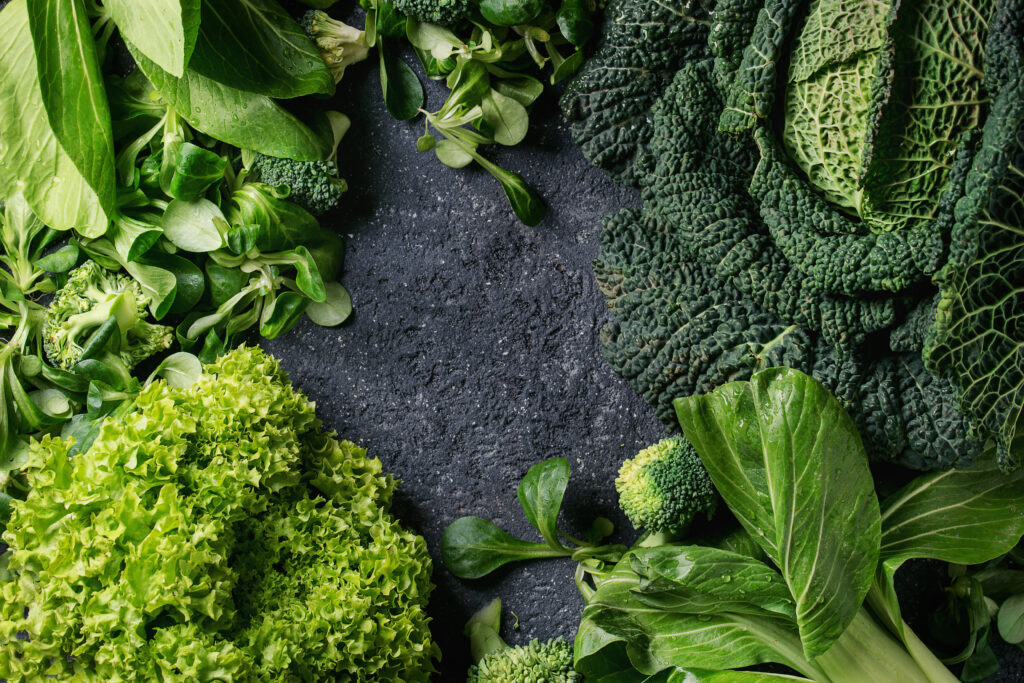
The presence of various flavonoids and carotenoids contributes to the anti-inflammatory properties of spinach, and it is also a good source of dietary fibre, promoting digestive health by preventing constipation and supporting a healthy gut.
100g spinach = 2.9g protein.
Top 10 Plant-Based Protein Sources: Conclusion
Proteins are involved in the repair and maintenance of various tissues in the body, not just muscles. This includes the skin, hair, nails, organs, and connective tissues. Enzymes, which are specialized proteins, facilitate biochemical reactions that support these processes.
Proteins are essential for a well-functioning immune system, maintaining the balance of fluids within and between cells, used for energy, especially during periods of calorie restriction or intense physical activity, and are more satiating than foods higher in carbohydrates or fats.
Remember to combine different plant-based protein sources to ensure you get a variety of essential amino acids.
You might also like:
